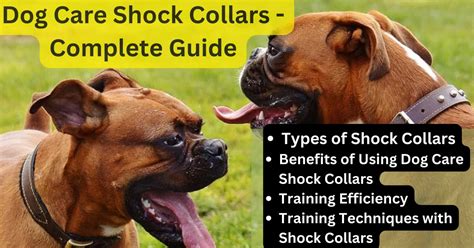Are you struggling to keep your beloved canine companion contained within your property boundaries? A dog shock collar fence might be the perfect solution for you.

What is a Dog Shock Collar Fence?
A dog shock collar fence, also known as an invisible fence or electronic pet containment system, is a revolutionary technology that uses a combination of a wireless collar and buried wire to create a virtual boundary around your yard. When your dog approaches the boundary, the collar emits a warning beep or vibration. If the dog continues to cross the boundary, the collar delivers a harmless but startling static correction.
Benefits of Dog Shock Collar Fences
- Peace of mind: Knowing that your dog is safely contained within your property boundaries provides peace of mind, especially for owners with active or adventurous dogs.
- Freedom for your pet: Unlike traditional fences, which can restrict your dog’s freedom and movement, shock collar fences allow your dog to roam freely within the designated area.
- No physical barriers: Invisible fences eliminate the need for unsightly or bulky physical fences, preserving the aesthetic appeal of your yard.
- Flexibility: Shock collar fences can be customized to fit the shape and size of your property, making them suitable for various yard configurations.
Choosing the Right Dog Shock Collar Fence System
- Consider your dog’s size and temperament: Different systems are designed for specific dog sizes and temperaments. Choose a system that matches your dog’s needs.
- Assess your property: Determine the perimeter of your yard and any obstacles that may interfere with the signal.
- Read reviews and compare features: Research various systems online and consult with dog trainers to find the best option for you.
How to Install a Dog Shock Collar Fence
- Mark the boundary: Use flags or stakes to mark the desired perimeter around your yard.
- Bury the wire: Dig a shallow trench along the marked boundary and bury the wire at a consistent depth of 2-3 inches.
- Install the transmitter: Place the transmitter box in a central location in your home and connect it to the buried wire.
- Train your dog: Gradually introduce your dog to the system by starting with a low correction level and rewarding good behavior.
Common Mistakes to Avoid
- Using the fence as punishment: Shock collar fences are not meant to punish dogs but to deter them from crossing the boundary. Avoid using the fence to discipline your dog.
- Ignoring the training process: Training is crucial for successful use of a shock collar fence. Take the time to properly train your dog to understand the system and its boundaries.
- Setting the correction level too high: Always start with the lowest correction level and gradually increase it as needed. Using a correction level that is too high can be harmful to your dog.
- Not testing the system regularly: Periodically check the system’s functionality to ensure it is working correctly. This includes testing the transmitter, collar, and buried wire.
Creative New Applications
Advanced Training: Shock collar fences can be used for advanced training purposes beyond simply deterring dogs from crossing boundaries. For example, they can be used to teach dogs specific commands, such as “sit” or “stay,” by associating the correction with the desired behavior.
Pet Integration: If you have multiple pets, such as a dog and a cat, you can use separate transmitters for each pet. This allows you to create different boundaries for each pet, ensuring their safety and harmony.
Enhanced Security: In addition to containing your dog, a shock collar fence can also alert you to any potential intruders. By setting up the fence to emit an audible alert when your dog approaches the perimeter, you can be notified of any unauthorized activity.
Tables
Table 1: Dog Shock Collar Fence Features
| Feature | Description |
|---|---|
| Boundary type | Wireless, using buried wire |
| Correction type | Warning beep, vibration, or static correction |
| Adjustable correction levels | Yes, typically multiple levels |
| Waterproof and rechargeable | Most systems are waterproof and come with rechargeable collars |
| Customizable boundary shape | Yes, can be customized to fit any yard configuration |
Table 2: Dog Shock Collar Fence Costs
| System Type | Average Cost |
|---|---|
| Basic system (for small dogs) | $150-$250 |
| Advanced system (for large dogs) | $250-$400 |
| Professional installation | $500-$1,000 |
Table 3: Dog Shock Collar Fence Safety Standards
| Organization | Standard |
|---|---|
| American Kennel Club (AKC) | Recommends using shock collar fences only as a last resort and with proper training |
| American Veterinary Medical Association (AVMA) | Cautions against using shock collar fences on dogs with anxiety or aggression issues |
| Humane Society of the United States (HSUS) | Discourages the use of shock collar fences for punishment or deterring aggression |
Table 4: Dog Shock Collar Fence Maintenance
| Task | Frequency |
|---|---|
| Check battery life | Monthly |
| Inspect collar and wire | Quarterly |
| Test transmitter functionality | Annually |
| Calibrate correction levels | As needed |
